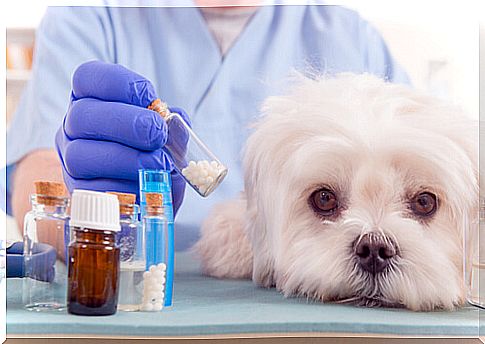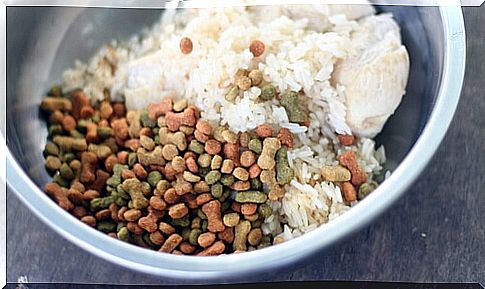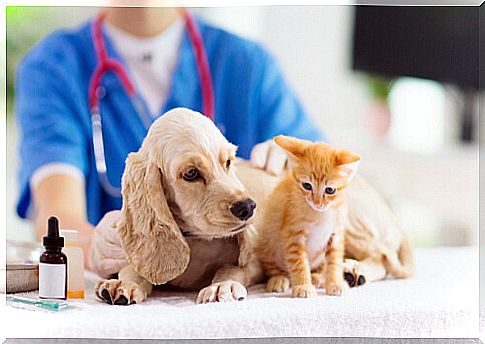Medicines And Home Remedies: What To Do And What Not To Do

Medicines and home remedies should be used sparingly, always following the veterinarian’s instructions, so that they have a good effect on pets and do not harm their health and well-being.
Although we may have medicines (for humans) and remedies made with natural remedies at home, that does not mean that they can be used in any way to relieve animals.
When a pet is sick, it is normal for us to worry and want to relieve it. However, when doing this, it is imperative to consider several issues.
Medicines and home remedies that can be effective in humans can be fatal in them. Not only because the doses are different, but because of the composition of the products itself.
Either because of their small size or because of their physiological differences, animals are very susceptible to certain substances. It is not uncommon in the daily veterinary consultation to attend to patients who suffer the consequences of having been treated with medicines or home remedies without first consulting the professional.
Medicines and home remedies suitable for pets
In order to understand why it is important to be careful when using medicines and home remedies in pets, we will make a division based on the targets of the products.
Skin

There are several options available when treating dermatological problems. Some of the most common are:
- Aloe vera: this is one of the plants that has the most properties. Aloe vera can be used on scars, burns, superficial wounds, skin irritations, insect bites. It has in its composition anti-inflammatory, healing, soothing and moisturizing substances.
- Honey: Considered a superfood and a super product, honey can be a good home remedy. Antiseptic, antibacterial and healing properties are attributed to it, for this reason, among other things, it is considered to be ideal for the treatment of superficial wounds. It is important to maintain hygiene in the area, since honey, being very sticky, can accumulate a lot of dirt.
- Olive oil: it can be very useful in hydrating cracked areas, for example on the pads. It can also be used to help remove ticks, since impregnating the bug in oil they tend to detach themselves. It doesn’t have to be extra virgin.
- Vinegar: due to its acidic pH, it is useful (always diluted in water) in the treatment of some infections. It has also turned out to be of interest in the treatment of some types of otitis.
Digestive system

Intestinal problems are common in pets, so this section could not be missed.
- Rice: especially indicated for non-specific gastrointestinal processes that occur with diarrhea. The high starch content of rice helps control diarrheal processes.
- Oral serum: in cases of dehydration, oral serum can help restore electrolyte balance. A liter of water with a tablespoon of sugar, half of salt, half of bicarbonate and the juice of half a lemon and we have the serum ready.
Respiratory system
- Physiological serum: useful in respiratory processes that cause mucus (which are many). Helps decongest the nostrils of pets. With the help of a syringe, we can apply small amounts through the nostrils of pets, and with a tissue clean the expelled content.
Medicines and home remedies NOT suitable for pets
Now we will see what should NOT be given to pets. For this, we have compiled the most frequent scenarios in relation to the misuse of products.
- Anti-inflammatories: undoubtedly the most common picture. Poisonings derived from the use in pets of Ibuprofen, Paracetamol or aspirin. Said drugs, with few exceptions, are totally prohibited, as they can cause fatal poisoning in pets.
- Tea tree oil: product on the rise in recent times, especially in the treatment of external parasites. When used correctly, it can provide certain benefits. However, an overdose or accidental ingestion of this oil could cause poisoning in pets.
- Homemade cough syrups: frequent case of the intoxicated animal when being treated with a home remedy based on onion and garlic. These two foods are very toxic in pets, so they should be avoided.
The advice of the veterinarian is essential

As you may have seen, it is not advisable to use medicines and home remedies on pets in any way. Ideally, when faced with discomfort, you should ask your veterinarian what would suit your pet best.
Without the professional’s instructions, it is easy to misuse the product, putting the health and even the life of the pet at risk. Therefore, it is not advisable to do without them.
Once again, it must be remembered that, although there are many products that animals can benefit from, there are many others that can endanger their health.








